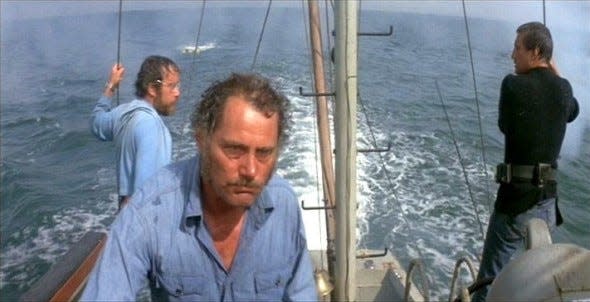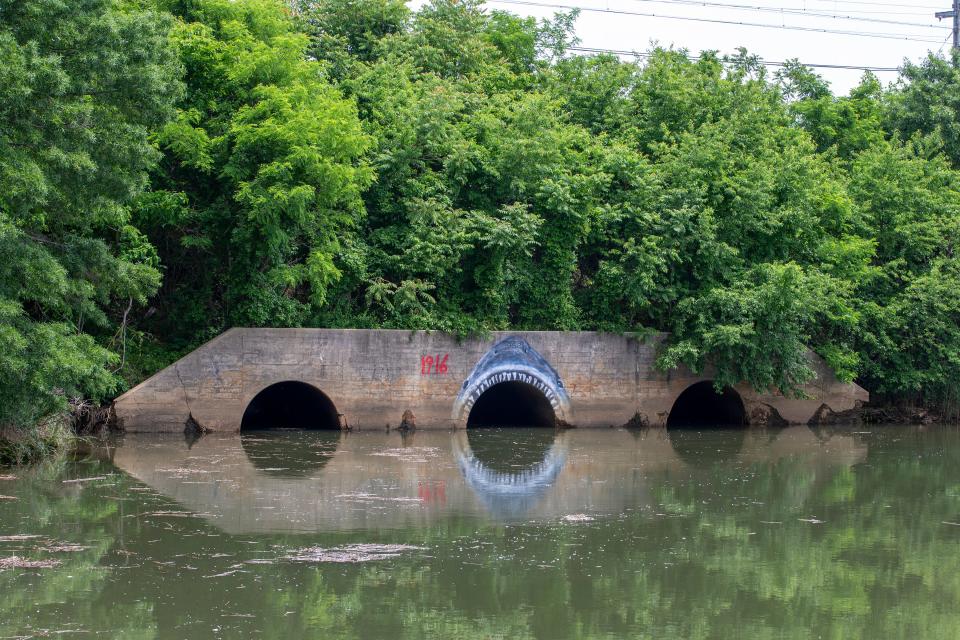Was 'Jaws' a true story? These eerily similar shark attacks took place in 1916.
Peter Benchley has said that his classic novel "Jaws" – which went on to inspire the summer blockbuster starring Richard Dreyfuss – was not inspired by the very real story of the 1916 shark attacks on the Jersey Shore.
But if you read any account of those shark attacks you might question the author's remarks.
In the summer of 1916, swimming in the ocean was still a new idea, Michael Capuzzo explains in his book "Close to Shore." And with the stifling heat on the East Coast, people flocked to the Jersey Shore to escape not just the heat, but diseases that were spreading in crowded cities.
The beach, with its sea air and a dip in the ocean, promised to be a place that would do a body good.
But many people would eventually think otherwise about that theory. As the movie nears its 50th anniversary, here's a look at the similarities.
Join our Watch Party! Sign up to receive USA TODAY's movie and TV recommendations right in your inbox

What were the shark attacks of 1916 in New Jersey?
On July 1, 1916, Charles Epting Vansant arrived from Philadelphia at the Engleside Hotel, located on the Jersey Shore, according to Matawan Historical Society. When he arrived, he was eager to get in the water, taking a swim in the water near the hotel at about 6 p.m.
And that's when he was attacked by a shark.
Lifeguard Alexander Ott attempted to save him, but Vansant later died from his wounds at the hotel.
Just five days later, Charles Bruder, 28, a bell captain at the Essex and Sussex Hotel in Spring Lake on the Jersey Shore, went swimming in the early afternoon with friends.
About 130 yards from shore, he was attacked by a shark. Accounts say Bruder's legs were bitten off by the time lifeguards got to him. He died from blood loss.
A few days later on July 8, a shark was spotted swimming just outside the ropes of a swimming area in Asbury Park.
"The lifeguard captain on duty took a boat out and beat it with an oar to chase it away. It was allegedly a 12-foot shark," the Matawan Historical Society wrote.

Then on July 12, the shark headed inland.
On the day in question, 11-year-old Lester Stillwell went swimming in Matawan Creek to beat the heat. Earlier that day, retired sea captain Thomas Cottrell stated that "he saw a dark, gray shape approximately eight feet in length, going west, up the creek, with the incoming tide." Just past 2 p.m. that day, Stilwell was attacked by a shark in front of his friends, who were also swimming. When his body was recovered, he was dead, as was his would-be rescuer, Stanley Fisher.
Just a short time later that day, 12-year-old Joseph Dunn was also attacked by a shark in the same creek. He ended up healing from his wounds. Others were injured in attempts to save both boys.
That same day, outraged Arris B. Henderson, the mayor of Matawan, "posted a $100 reward for 'killing the shark.' "
Taking that bait, three days later, a shark was caught.
The historical society stated that "a large shark was caught in Raritan Bay and put on display to over 3,000 people at ten cents each." It was thought to be the shark involved in all the attacks. But nobody was absolutely certain.
In the end, a total of four people died from the shark attacks that year.
What did Peter Benchley say inspired 'Jaws'?
While Benchley acknowledged the shark attacks of 1916 in interviews, he told the BBC that "the novel grew out of his lifelong interest in shark attacks, including the exploits of Frank Mundus, the Montauk, Long Island, sport fisherman who landed a record 3,427-pound great white."
What are the similarities between 'Jaws' and the 1916 shark attacks?
These are the parallels in the attacks:
Benchley’s shark kills four people, including a victim in an estuary, similar to Matawan Creek.
The mayor of Matawan initially denied the attacks were actually happening, as did the mayor of "Amity," the town where "Jaws" mainly takes place.
Fictional "Jaws" ichthyologist Matt Hooper warns people that shark attacks happened in 1916 and could happen again.
Crazed men led a shark hunt in Matawan in 1916, according to the historical society, and so did a crew of money-hungry fishermen in "Jaws."
This article originally appeared on wickedlocal.com: Is 'Jaws' a true story? Similar shark attacks in 1916 were.
